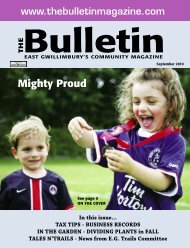•A National Treasure •Tame Your Temper •Diet Mistakes
•A National Treasure •Tame Your Temper •Diet Mistakes
•A National Treasure •Tame Your Temper •Diet Mistakes
You also want an ePaper? Increase the reach of your titles
YUMPU automatically turns print PDFs into web optimized ePapers that Google loves.
Tax Tips<br />
by Ian Hawkins<br />
Claiming DEPENDENTS (children)<br />
We continually run into issues with clients who have been told stuff by previous tax preparers that is just plain<br />
WRONG! A case in point is the issue of claiming children as dependents when there is a separation or divorce.<br />
Many clients come to us believing that when separated and there is more than one child, each party can claim<br />
one. This is not and never has been the case.<br />
The rules are very clear. Other than shared custody, only one party can claim the children and if the parties<br />
cannot agree as to who that is then NEITHER can. This unfortunately can lead to one party holding the other<br />
to ransom. There are some steps to avoid these problems.<br />
1. Notify CRA immediately of a change in marital status by using and filing form RC65,<br />
2. Negotiate a custody agreement - and get it in writing and signed as soon as practical - and give a copy to<br />
CRA.<br />
In cases of shared custody, the 2010 budget recently changed the rules slightly to allow both parties to SHARE<br />
the credits falling from dependent children. Previously they agreed to allow sharing on a rotational basis but<br />
when one party got the credits, the other did not. The general scenario was that a party got credits for half a<br />
year only and the other got the credits for the other half of the year. This was in effect up to June 30, 2011.<br />
So what are the rules? (up to 2010 tax year)<br />
Amount for children born in 1993 or later<br />
You can claim $2,101 for each of your or your spouse's or common law partner's children who are under 18<br />
years of age at the end of the year.<br />
The full amount can be claimed in the year of the child's birth, death, or adoption.<br />
Child lives with both parents<br />
If the child resides with both parents throughout the year, either you or your spouse or common-law partner<br />
can make the claim.<br />
If you are making this claim for more than one child, either you or your spouse or common-law partner must<br />
make the claim for all children under 18 years of age at the end of the year and resided with both of you<br />
throughout the year.<br />
Child does not live with both parents<br />
If the child does not reside with both parents throughout the year, the parent or the spouse or common-law<br />
partner who claims the amount for an eligible dependent for that child, can make the claim.<br />
34 “LIKE” East Gwillimbury’s Bulletin Magazine on FACEBOOK
















